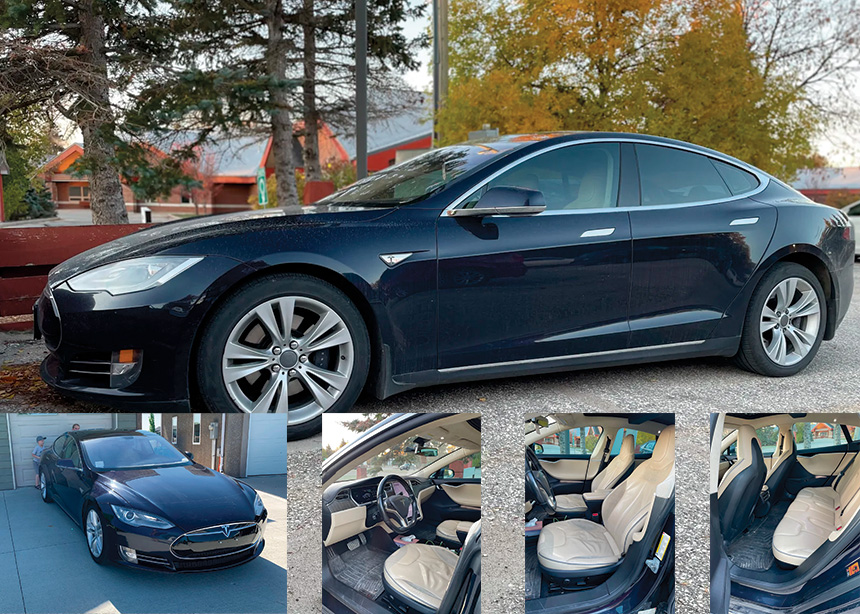I came closer than I’d like to admit.
Three weeks before a family road trip to Ontario, our ex-Hutterite mechanic gave our 2004 Jetta wagon the death sentence. The ensuing car search turned into a troubling family crash course in the psychology of real-life environmental ethics.
A used Prius—Toyota’s time-tested hybrid—was the obvious option: durable, fuel efficient (partly because it generates electricity while braking to later assist the gas engine) and large enough to haul the amount of eggs and produce our mini-farm generates. It’s also notoriously utilitarian and gutless, so our boys, 12 and 15, went to work on more peppy and stylish options. Their focus landed on a used Tesla.
We were willing to pay extra for an electric vehicle (EV), but we live 140 kilometres from Winnipeg and drive there more than our consciences like, sometimes to deliver eggs and sometimes to deliver young soccer players, so range would be an issue.
The only real option with sufficient space and range was a 2013 Tesla Model S, listed for $39,000 (“loaded”) by a guy in a nearby town. That was double what we hoped to pay, but not impossible.
Part of me could not stomach the idea of owning a sleek, high-end 440-horsepower car, and part of me really wanted to find a justification. I was leaning Elon.
In the process, I talked to six EV owners, a few highly ethical friends who could never afford an EV, and an Indigenous friend who lives too far north to even consider it.
One moment stands out. After talking to the guy who was selling the 2013 Tesla, my wife Jennifer noted that if this guy drove more than us—which he did, for his paramedic job—and if he was selling the car and going gas for financial reasons—which he was—then the environmentally optimal move would be for us to buy a cheaper gas car and offer him a low-interest loan so he could continue to drive the Tesla. As illogical as that sounds, it was a pivotal question about true motives. Net emissions would be lower if the person who drove more had the EV.
If we were considering a $39,000 Tesla instead of a $21,000 Prius (also used), and if limiting environmental impact were truly our goal, we had to ask: How could we do most good with $18,000? By parking a luxury vehicle in our driveway?
I have chronic guilt around driving and I realized I was almost willing to spend $18,000 extra for the privilege of driving with less guilt.
I wanted to buy off my conscience. I wanted to greenwash myself. The goal of making myself feel good had obscured the goal of doing what I considered right.
I see this dynamic in church. Rather than do what is most effective or strategic; rather than face truth square on; rather than do what makes most sense, we too often do what makes us feel we are doing something. We recycle rather than reduce, we create study resources rather than bold action plans, we share land rather than give it back, we donate money from a distance rather than time on the margins, we buy an EV or hybrid rather than arrange our lives to reduce driving. We do what makes us feel good.
Feeling good is not bad, but it can pre-empt change and short-circuit inner transformation.
My point is less about the pros and cons of EVs—a truly complex matter—than the dangers of self-delusion. We do well to examine our decisions and motives with honesty.
Honesty required that our car deliberations acknowledge the possibility of moving to Winnipeg or getting out of the egg and/or soccer business to reduce driving. Those were shorter conversations. We choose our compromises. We also try to name them and revisit them.
We drove to Ontario in a rental car and bought a red 2017 Prius from a friendly redneck in a little town northeast of Kitchener. The paperwork done, I drove off, sighed, clicked on the radio, and rolled past horse-and-buggy farms listening to The Washboard Union sing “I Run on Country.” But I was not running on country, nor on horse power, nor on 100 percent battery power; I was running on gasoline, with the occasional dash of guilt-free electricity. There’s no free ride.
Our boys endorsed and lamented the decision (the car truly is dull), then started researching which used, modest EV we might get once range increases and price decreases.
Will Braun welcomes feedback at editor@canadianmennonite.org.
Read more editorials:
In-house acknowledgment
A centuries-old offer of peace
Do we dare to succeed?
No shortcut to Easter
Is the ban back?








Leave a Reply
You must be logged in to post a comment.